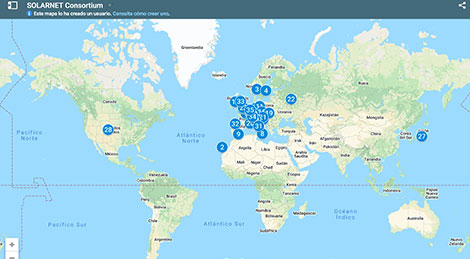The SOLARNET consortium successfully defended the mid-term review of the project by the EU Commission on November 9th, 2020. The evaluation committee was presided by EU Project Officer Dr. Mina Koleva and Prof. Dr. Kristof Petrovay from Eötvös Loránd University, Budapest, Hungary, acting as the external reviewer. The meeting was organized via zoom and attended by 33 members from the consortium.
The SOLARNET H2020 project started on January 1, 2019, with one of the primary objectives to integrate the major European research infrastructures in the field of high-resolution solar physics, to promote their coordinated use and instrumentation development. Despite the initial setback in the year 2020 with the sudden outbreak of the COVID 19 pandemic and lockdown imposed by the governments, the commitment, untiring coordinated efforts, and huge motivation from all its 35 consortium members enabled SOLARNET to accomplish its deliverables and milestones at a success rate of 93.5% and 60% respectively within its originally planned timeframe. The commendable efforts did not go unnoticed by the evaluation committee who did not hesitate to congratulate the consortium.
A particular highlight was the on-track Trans-National Access Programme which provided easy access to telescope infrastructures in the Canary Islands in addition to the Piz-Daint supercomputer owned by the Swiss National Computing Center. A total of 90 researchers, primarily across EU organizations and a few from non-EU institutions, have benefitted from the access to the installations. This not only facilitated collaboration and networking but also provided an opportunity to link theory with observations. The services at these infrastructures were also improved. Particular highlights are the capacity development to provide service-mode observations for SST and remote-based observations for GREGOR. Virtual access activities have progressed as planned: new data have been added to the archives and steps have been taken towards the addition of higher-level data products.
Another highlight of the SOLARNET project is the industry-academy partnership which forms an integral association of the project as part of the joint research activities. It is playing a critical role towards the development of advanced cutting-edge European solar instrumentation. In the words of Prof. Dr. Kristof Petrovay, “The participation of SMEs in the consortium goes far beyond a formal association. Highly intense collaborative links have been maintained between the SMEs and academic institutions, with strong networking focused on the development of innovative, state-of-the-art technologies and solutions. In this respect, the project might even potentially serve as a showcase for the successful promotion and support of industry-academia partnerships leading to world-leading new technological developments with EU support.”
Due to COVID 19, several of the SOLARNET’s workshops and schools had to be postponed. After an initial success where 8 early-stage and 4 senior researchers could execute their research stays outside their home institutions, the mobility programme suffered a major impact due to lockdown restrictions. This programme is currently suspended but can be expected to resume once international travel is unrestrained.
With the on-going restrictions on travel, the 2nd General Assembly Meeting is planned for February 4, 2021 when the whole consortium will meet online and discuss the next strategies towards achieving the project objectives.
Written by Tirtha Som (Leibniz-Institut für Sonnenphysik, Freiburg, Deutschland)

